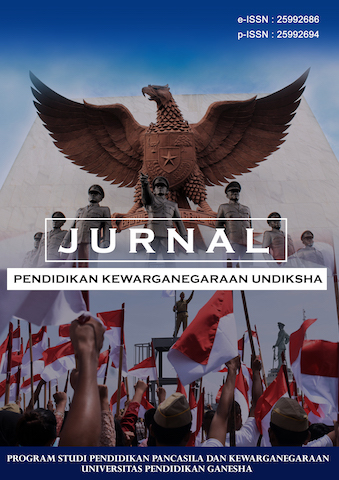TANTANGAN DALAM REHABILITASI KELOMPOK RENTAN DI LEMBAGA PEMASYARAKATAN: STUDI KASUS PADA NARAPIDANA REMAJA DENGAN GANGGUAN MENTAL
Kata Kunci:
Rehabilitation, Juvenile prisoners, Mental disordersAbstrak
Rehabilitation of vulnerable groups in correctional institutions is a challenging task, especially for juvenile prisoners with mental disorders. This study carries out an in-depth analysis of the challenges faced in efforts to rehabilitate vulnerable groups in correctional institutions with a focus on juvenile prisoners who experience mental disorders. The research method used is a qualitative approach with case studies in correctional institutions which have special facilities for juvenile prisoners with mental disorders. Data was collected through participant observation and in-depth interviews with juvenile inmates, correctional officers and related medical personnel. Based on data analysis, this research identifies several challenges in the rehabilitation of vulnerable groups in correctional institutions. First, there are limited adequate facilities and resources to provide appropriate care and treatment for juvenile prisoners with mental disorders. Second, there is social stigmatization of juvenile prisoners with mental disorders which complicates their rehabilitation and reintegration process into society. Third, there is a lack of coordination and collaboration between correctional institutions, medical personnel and other related parties. The findings of this research indicate the need to improve adequate facilities and resources, increase understanding of mental disorders and rehabilitation, and increase collaboration between correctional institutions, medical personnel and other related parties. Thus, rehabilitation efforts for vulnerable groups in correctional institutions can provide significant benefits for juvenile prisoners with mental disorders and improve their quality of life.
Referensi
Anindita, D. N., & Butar, H. B. (2021). Implementasi Permenkumham No 12 tahun 2017 dalam Upaya Rehabilitasi Narapidana Narkotika. Innovative: Journal Of Social Science Research.
Cahyani, H., Asikin, M., & Hengky, H. K. (2020, Januari). FAKTOR –FAKTOR YANG MEMPENGARUHI MASALAH KESEHATAN MENTAL PADA NARAPIDANA NARKOBA DI RUTAN KELAS IIB SIDRAP. Jurnal Ilmiah Manusia dan Kesehatan.
Jainah, Z. O., & Anggara, Y. D. (2022). EFEKTIVITAS TERAPI DUKUNGAN KELOMPOK DALAM MENINGKATKAN RESILIENSI PADA REMAJA PENGHUNI LEMBAGA PEMASYARAKATAN. Legitimasi: Jurnal Hukum Pidana dan Politik Hukum .
Muiz, R. H., & Sulistyarini, R. I. (2015). EFEKTIVITAS TERAPI DUKUNGAN KELOMPOK DALAM MENINGKATKAN RESILIENSI PADA REMAJA PENGHUNI LEMBAGA PEMASYARAKATAN. Jurnal Intervensi Psikologi.
Purnamasari, Y., Fitri, N., & Mardiana, N. (2023). FAKTOR-FAKTOR YANG MEMENGARUHI GANGGUAN MENTAL EMOSIONAL REMAJA SMA. Jurnal Penelitian Perawat Profesional, 5.
UNDANG-UNDANG NO. 39 TAHUN1999 Pasal 5 Ayat 3. (n.d.).
Zed, M. (2003). Metode Penelitian Kepustakaan. Yayasan Obor Indonesia.
Unduhan
Diterbitkan
Terbitan
Bagian
Lisensi

Artikel ini berlisensiCreative Commons Attribution-ShareAlike 4.0 International License.
Authors who publish with the Jurnal Pendidikan Kewarganegaraan Undiksha agree to the following terms:
- Authors retain copyright and grant the journal the right of first publication with the work simultaneously licensed under a Creative Commons Attribution License (CC BY-SA 4.0) that allows others to share the work with an acknowledgment of the work's authorship and initial publication in this journal.
- Authors are able to enter into separate, additional contractual arrangements for the non-exclusive distribution of the journal's published version of the work (e.g., post it to an institutional repository or publish it in a book), with an acknowledgment of its initial publication in this journal.
- Authors are permitted and encouraged to post their work online (e.g., in institutional repositories or on their website) prior to and during the submission process, as it can lead to productive exchanges, as well as earlier and greater citation of published work. (See The Effect of Open Access)










